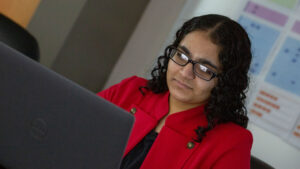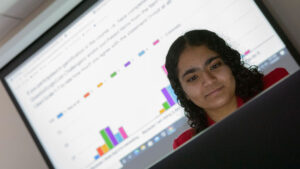Tina Sindwani
Computer systems engineering
Hometown: Tempe, Arizona, United States
Graduation date: Fall 2023

FURI | Fall 2021
Impact of Gamification on Student Motivation and Success in Engineering Courses
The research question that this project seeks to answer is the impact of gamification in two engineering courses, one at the freshman level and the other junior, on students’ overall success and motivation, based on academic performance, academic level, and gender. This research question is addressed using both quantitative and qualitative research methods. In each of the two courses, students were provided with opportunities to complete optional tasks to benefit their learning. In turn, students earn tokens that can be used to acquire a small benefit. The research will yield results for college-level technical engineering courses.
Mentor: Alicia Baumann, Haolin Zhu
Featured project | Fall 2021
Computer systems engineering sophomore Tina Sindwani is investigating how gamifying engineering courses impacts student motivation and success in her FURI project with Senior Lecturer Haolin Zhu and Lecturer Alicia Baumann. Sindwani is interested in improving how instructors teach technical science, technology, engineering and math concepts for her FURI project as well as her work in GCSP and honors thesis in ASU’s Barrett, The Honors College and her own nonprofit organization called The Scientific Teen.
What made you want to get involved in FURI and the project you’re working on?
I wanted to get involved with FURI and this project because I wanted to explore how we can make the educational experience more engaging and enlightening for students. I love learning and teaching others, and I want to make sure that as educators we are as prepared and knowledgeable as we can be about the learning needs of our students. Our project explores gamification in engineering education and how it affects student motivation. The results of this research can help us find what gamification techniques, if any, can help improve student engagement and performance.
How will your engineering research project impact the world?
STEM education really has the power to change the world. People can learn to engineer themselves out of their own problems. Unfortunately, in many parts of the world, it’s not taught well, or at all. Engineering is often seen as a set of difficult subjects that can only be learned by the “smartest” people or by rote memorization, and that is the opposite of reality. In reality, we are all curious and inquisitive in our own ways. We may not realize it, but we use science and technology in nearly every aspect of our lives. Knowing how the forces of nature work and how we can manipulate them can help empower people to make things better for themselves by using those skills and knowledge.
What has been your most memorable experience as a student researcher?
My most memorable experience was realizing that so many students had found gamification useful. As someone interested in improving education, this was an exciting find for me.
How has this experience helped you in other areas of your life?
I am a computer systems engineering student myself, and learning what techniques help or don’t help educate students can help me as a student as well. It can give me new perspectives as a learner.
I also run an international STEM communication nonprofit called The Scientific Teen with the goal to educate people on STEM topics and to encourage STEM career pathways. This project can help me apply the techniques that help students learn to my own nonprofit work as well as international education work I see myself doing in the future.
What is the best advice you’ve gotten from your faculty mentor?
Take it patiently — research is a long but rewarding process!
Why should other students get involved in FURI?
FURI is a great way to get research experience and explore your interests while being mentored by an expert. It’s the perfect way to explore research while you are still in college. I am extremely glad I took on the challenge of this experience.


